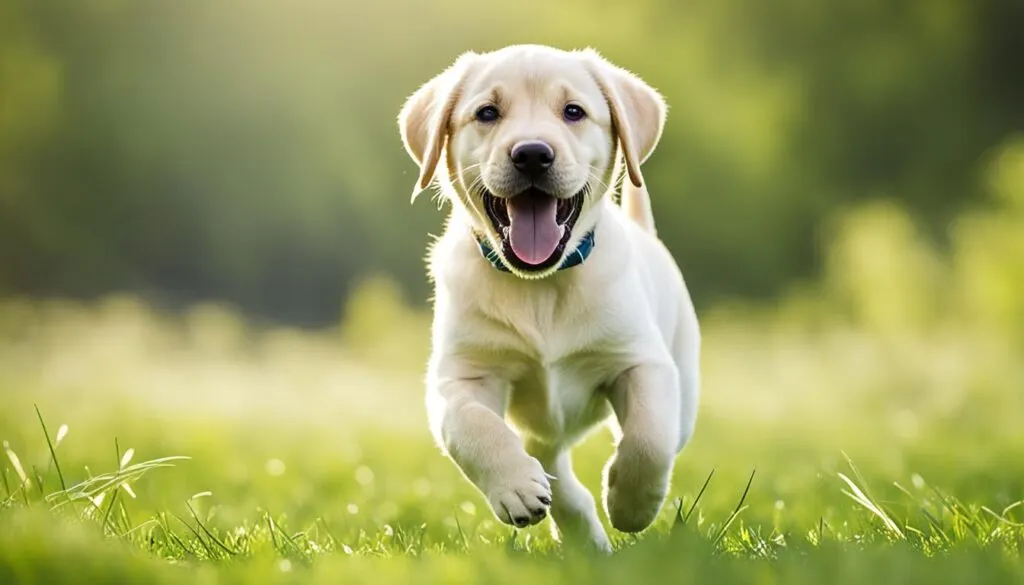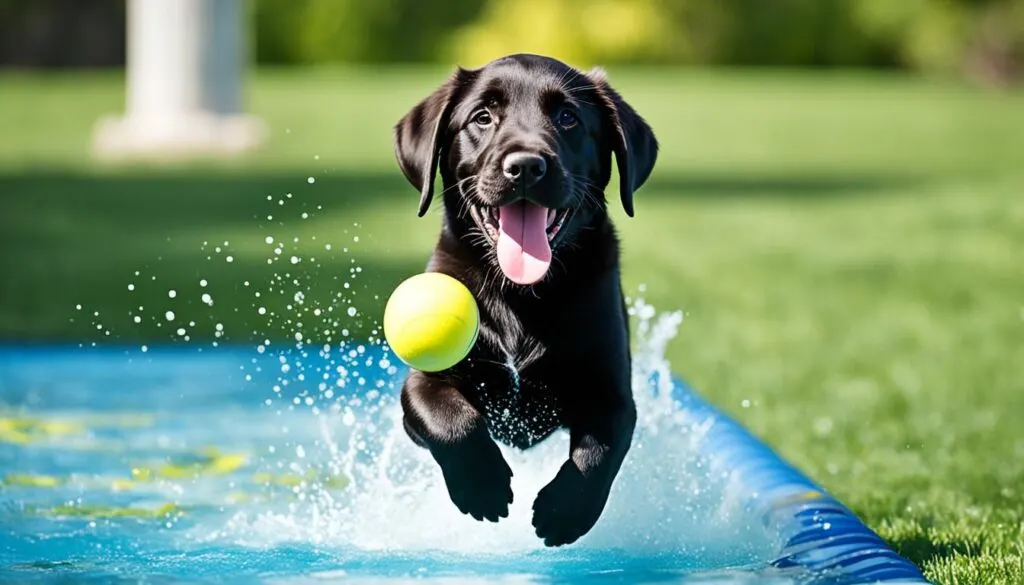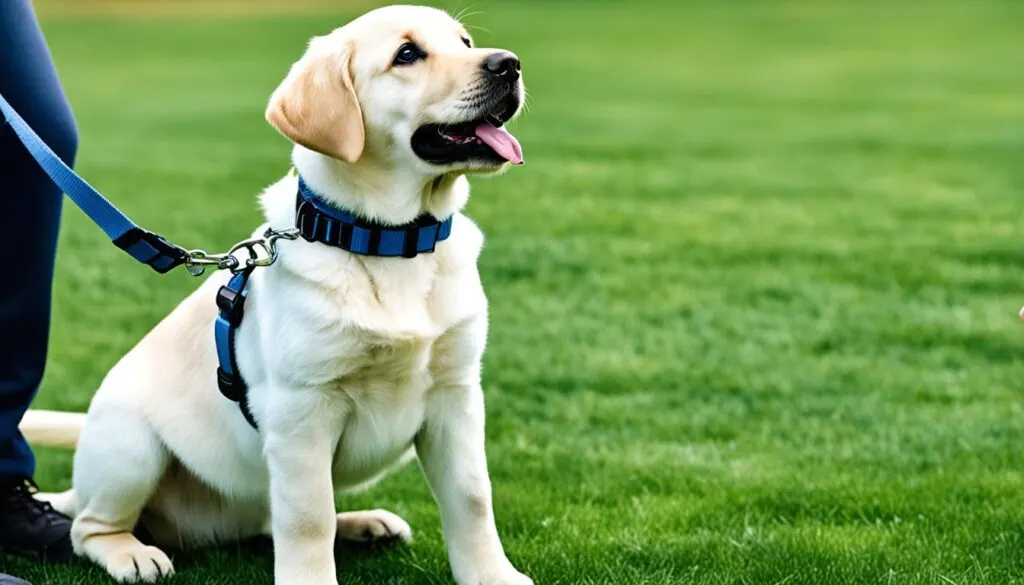Welcome to our comprehensive guide on caring for and training a Labrador Retriever puppy.
Labrador Retrievers are renowned for their intelligence, loyalty, and friendly nature.
Whether you’re a first-time dog owner or experienced with other breeds, this guide will provide you with valuable insights and practical tips to ensure your Labrador Retriever puppy thrives in all aspects of their life.
From establishing a safe and comfortable environment to nutrition, socialization, potty training, exercise routines, obedience training, grooming, healthcare, and addressing behavior issues, we’ll cover every essential aspect of raising a happy, healthy, and well-behaved Labrador Retriever puppy.

Labrador puppies require specialized care and attention to ensure their physical and mental development.
Our guide will provide you with step-by-step instructions, expert advice, and proven techniques to guide you through the process.
So, whether you’re looking for tips on housebreaking your Labrador Retriever puppy, introducing them to new experiences and social interactions, or teaching them basic obedience commands, you’ve come to the right place.
Our guide will equip you with the knowledge and tools you need to nurture a lifelong bond with your furry friend.
Click Here to Jump to a Section
Key Takeaways:
- Labrador Retriever puppies require a safe and comfortable environment.
- Proper nutrition is essential for their growth and well-being.
- Socialization is crucial to ensure a friendly and well-adjusted dog.
- Potty training should be approached with patience and consistency.
- Regular exercise and mental stimulation are vital for a happy, healthy puppy.
Setting Up a Safe and Comfortable Environment
When bringing home a Labrador Retriever puppy, it’s important to create a safe and comfortable environment that promotes their well-being.
Taking the time to puppy-proof your home, creating a cozy sleeping area, and selecting appropriate toys and accessories are essential aspects of caring for your new furry friend.
Puppy-Proofing Your Home
Puppies are naturally curious, and their exploration can sometimes lead to accidents or injuries.
To prevent any mishaps, it’s crucial to puppy-proof your home.
Keep harmful chemicals, medications, and toxic plants out of reach.
Secure loose wires and cords, and block off areas that may pose a danger to your puppy.
Creating a Cozy Sleeping Area
Providing a comfortable sleeping area is essential for your Labrador Retriever puppy’s rest and relaxation.
Choose a quiet spot in your house where they won’t be disturbed.
Consider using a crate or a soft, cozy bed that provides support for their growing body.
Make sure the sleeping area is warm and well-ventilated.
Choosing Appropriate Toys and Accessories
Labrador Retrievers are known for their playful nature, and providing them with appropriate toys and accessories is vital for their mental and physical stimulation.
Opt for toys that are size-appropriate and made of durable materials.
Avoid toys with small parts that can be swallowed.
Additionally, consider providing chew toys to help with teething and dental health.
Remember, regular toy rotation can help keep your puppy engaged and prevent boredom.
By taking these steps to set up a safe and comfortable environment for your Labrador Retriever puppy, you are ensuring their well-being and helping them adjust to their new home.
Remember to supervise and provide guidance as they explore their surroundings, allowing them to grow into happy and healthy adult dogs.
Feeding and Nutrition
Proper nutrition plays a crucial role in the healthy development of your Labrador Retriever puppy.
Providing a well-balanced diet is essential for their growth, energy levels, and overall well-being.
In this section, we will guide you through the labrador retriever puppy feeding guide to help you ensure your furry friend receives the necessary nutrients for optimal health and vitality.

Recommended Diet
When it comes to choosing the right food for your labrador retriever puppy, opt for high-quality dog food specifically formulated for puppies.
Look for options that meet the nutritional requirements set by reputable organizations, such as the Association of American Feed Control Officials (AAFCO).
These diets are usually labeled as “complete and balanced” and are designed to support the growth and development of puppies.
Feeding Schedule
Establishing a consistent feeding schedule is important for your labrador retriever puppy’s digestive health and overall routine.
Aim to feed your puppy at the same times each day to regulate their hunger levels and promote healthy eating habits.
Most labrador retriever puppies thrive on three meals a day until they reach around six months of age.
After six months, you can gradually transition them to two meals a day.
Portion Sizes
Determining the appropriate portion sizes for your labrador retriever puppy is crucial to prevent overfeeding or underfeeding.
Follow the feeding guidelines provided on the dog food packaging as a general starting point, and adjust based on your puppy’s individual needs and activity levels.
It’s essential to monitor their weight regularly and consult with your veterinarian to ensure your labrador retriever puppy maintains a healthy body condition.
Tips for Managing Nutritional Needs
- Provide access to fresh, clean water at all times to keep your labrador retriever puppy well-hydrated.
- Avoid feeding your puppy table scraps, as human food can be harmful and lead to nutritional imbalances.
- Consider incorporating age-appropriate treats into their diet for training purposes or as occasional rewards. Remember to factor in the additional calories when calculating their overall food intake.
- Monitor your labrador retriever puppy’s weight and body condition regularly, making adjustments to their diet as needed.
By following these labrador retriever puppy feeding guidelines, you can ensure that your furry friend receives the proper nutrition they need for a healthy and happy life.
Socializing Your Labrador Retriever Puppy
Socializing your Labrador Retriever puppy is crucial for their development into well-adjusted, friendly dogs.
By exposing them to various people, environments, and other animals, you can help them build confidence, reduce fear, and develop proper social skills.
One of the benefits of socialization is that it teaches your Labrador puppy how to interact appropriately with others.
It helps them understand how to communicate, interpret body language, and establish boundaries.
This is especially important for a breed known for its friendly and outgoing nature.
When socializing your Labrador Retriever puppy, start early and make it a positive experience.
Gradually introduce them to new people, both adults and children, ensuring that each encounter is calm and controlled.
Provide treats or rewards for good behavior to reinforce positive associations.
Expose your puppy to various environments and situations.
Take them on walks in different neighborhoods, visit parks, pet-friendly stores, or arrange playdates with other friendly and vaccinated dogs.
These experiences will help them become comfortable and confident in different settings.
Supervised play with other animals can also aid in their socialization.
Allow them to interact with well-behaved dogs, cats, and other animals, always monitoring their behavior and intervening if necessary.
Key Techniques for Labrador Puppy Socialization:
- Positive Reinforcement: Reward good behavior with treats, praise, and affection.
- Gradual Exposure: Introduce new experiences in a gradual and controlled manner to prevent overwhelming your puppy.
- Consistency: Maintain a consistent socialization routine to reinforce positive behaviors and help your Labrador puppy feel secure.
- Patience: Each puppy progresses at its own pace, so be patient and provide support throughout the socialization process.
- Professional Training: Consider enrolling your Labrador Retriever puppy in puppy training classes to enhance their socialization skills under the guidance of professional trainers.
Socialization is an ongoing process that should continue throughout your Labrador Retriever puppy’s life.
By prioritizing socialization during their early months, you can help them become confident, well-behaved, and enjoyable companions.
Potty Training Your Labrador Retriever Puppy
Potty training is an essential part of raising a happy and well-behaved Labrador Retriever puppy.
By being consistent and patient, you can successfully teach your puppy where and when to do their business.
To start the potty training process, it is recommended to use crate training.
This method utilizes your puppy’s natural instinct to keep their sleeping area clean.
Choose a crate that is big enough for your puppy to stand, turn around, and lie down comfortably.
- Introduce your puppy to the crate gradually, making it a positive and comfortable space by placing treats and toys inside.
- Establish a routine by taking your puppy outside to their designated potty area first thing in the morning, after meals, after playtime, and before bedtime.
- When your puppy successfully eliminates in the appropriate spot, reward them with praise, treats, or playtime to reinforce the desired behavior.
- If your puppy has an accident indoors, do not punish or scold them. Instead, calmly clean up the mess and continue with the training process.
- Consistency is key. Stick to the established routine and be patient with your puppy as they learn.
Potty training may take some time, as each puppy learns at their own pace.
Stay positive and consistent in your approach, and eventually, your Labrador Retriever puppy will understand where they should go potty.
Exercise and Physical Activity
Labrador Retrievers are highly energetic breeds that thrive on regular exercise.
Providing them with sufficient physical activity is crucial for their overall health and happiness.
In this section, we will explore the appropriate exercise routines, activities, and mental stimulation that will keep your Labrador Retriever puppy physically and mentally stimulated.
Regular exercise is not only important for maintaining a healthy weight but also helps prevent boredom and destructive behavior.
A tired Labrador is typically a well-behaved Labrador.
When it comes to exercise, Labs enjoy a variety of activities.
One of the best ways to ensure they get enough exercise is by taking them on daily walks or hikes.
Aim for at least 30 minutes to an hour of brisk walking or jogging each day to keep your Labrador’s energy levels in check.
Additionally, engaging in activities that challenge their intelligence, such as puzzle toys or obedience training, can help stimulate their minds and prevent them from getting bored.
Labs are intelligent and love to learn, so incorporating mental stimulation into their exercise routine is highly beneficial.
Playing games such as fetch or tug-of-war is another great way to keep your Labrador active and engaged.
These activities not only provide physical exercise but also strengthen the bond between you and your furry companion.
Swimming is a natural talent for Labradors, as they are excellent swimmers.
If you have access to a safe swimming area, taking your Labrador for a swim is a fantastic exercise option.
It is low-impact and gentle on their joints, making it ideal for older or arthritic Labradors.
Remember to adjust the intensity and duration of exercise based on your Labrador’s age, health, and individual needs.
Consult with your veterinarian to create a personalized exercise plan that suits your Labrador Retriever puppy’s needs.

Basic Obedience Training
Teaching your Labrador Retriever puppy basic obedience commands is crucial for their safety, well-being, and overall behavior.
By establishing a strong foundation of obedience, you can ensure a harmonious relationship with your furry companion.
Training techniques:
- Start with simple commands such as “sit,” “stay,” and “come.” Use clear and consistent verbal cues along with hand signals to help your puppy understand.
- Positive reinforcement is key. Reward your puppy with treats, praise, and affection when they follow a command correctly. This encourages them to repeat the desired behaviors.
- Consistency is essential. Set aside regular training sessions, preferably short and frequent, to reinforce commands and practice obedience in various environments.
Remember, patience and repetition are crucial during the training process.
Each puppy learns at their own pace, so it’s important to be patient and avoid punishments or harsh methods that can lead to fear or anxiety.

Importance of basic obedience:
Basic obedience training provides numerous benefits to your Labrador Retriever puppy.
Not only does it improve their behavior, but it also enhances communication between you and your furry friend.
Through obedience training, you are encouraging positive habits, reinforcing their listening skills, and establishing a strong bond.
As your Labrador Retriever puppy learns basic obedience commands, they become more manageable in various situations.
This obedience allows you to have control over their actions, especially in potentially dangerous situations where a command like “stop” or “stay” can prevent accidents or injuries.
Furthermore, obedience training sets the groundwork for more advanced training activities and reduces the likelihood of behavior issues down the road.
With a well-trained Labrador Retriever puppy, you can enjoy their company both at home and in public settings, fostering a peaceful and positive environment for everyone.
Grooming and Healthcare
Proper grooming and healthcare practices are essential for the overall health and well-being of your Labrador Retriever puppy.
By establishing a regular grooming routine and staying up-to-date with their healthcare needs, you can help ensure that your furry friend remains happy and healthy throughout their life.
Grooming Routines
Grooming your Labrador Retriever puppy not only keeps them looking neat and tidy, but it also helps maintain their skin and coat health.
Regular brushing, bathing, and nail trimming are key components of a proper grooming routine.
Brushing your puppy’s coat removes loose hair and prevents matting, while bathing helps keep their skin clean and free from any irritants.
Additionally, trim your puppy’s nails regularly to prevent discomfort and potential injuries.
Dental Care
Proper dental care is crucial for your Labrador Retriever puppy’s oral health.
Regularly brushing their teeth using a dog-specific toothbrush and toothpaste can help prevent dental issues such as tartar buildup, gum disease, and bad breath.
Additionally, providing appropriate dental chews and toys can aid in keeping their teeth clean and strong.
Vaccinations and Veterinary Check-ups
Regular vaccinations are essential for protecting your Labrador Retriever puppy against common infectious diseases.
Consult with your veterinarian to ensure that your puppy receives the necessary vaccinations at the appropriate times.
Furthermore, regular veterinary check-ups allow your veterinarian to monitor your puppy’s overall health, address any concerns, and provide necessary preventive care.
Common Health Issues
Labrador Retrievers are generally healthy dogs, but they can be prone to certain health issues.
Being aware of these common health problems can help you detect them early and seek appropriate veterinary care.
Some common health issues in Labrador Retrievers include hip and elbow dysplasia, obesity, allergies, and ear infections.
Paying attention to your puppy’s behavior, appetite, and physical appearance can help you identify any potential health problems promptly.
By following proper grooming routines, maintaining good dental care, staying up-to-date with vaccinations and veterinary check-ups, and being aware of common health issues, you are taking important steps toward ensuring the well-being of your Labrador Retriever puppy.
Remember, prevention and regular care are the keys to a long and healthy life for your beloved furry friend.
Addressing Behavior Issues
During their development, Labrador Retrievers may encounter behavior challenges that require proper training techniques.
By addressing these issues promptly and effectively, you can ensure a harmonious relationship with your furry companion.
Chewing
Labrador Retrievers, like all puppies, have a natural instinct to chew.
To prevent destructive chewing, provide them with appropriate chew toys and supervise them during playtime.
Redirect their attention to the toys whenever they start chewing on inappropriate objects.
Jumping
Jumping can be a common issue with Labrador Retrievers, especially when they get excited.
To discourage jumping, teach them the “off” command and reward them for keeping all four paws on the ground.
Consistency and positive reinforcement are key to addressing this behavior.
Barking
Excessive barking can be a challenge with Labrador Retrievers.
To train them to bark appropriately, identify the triggers and redirect their attention to positive behaviors.
Reward your pup when they remain calm in situations that previously caused excessive barking.
Separation Anxiety
Labrador Retrievers are social animals and may experience separation anxiety when left alone.
Gradual desensitization, crate training, and providing them with interactive toys can help alleviate this anxiety.
Increasing their independence by gradually leaving them alone for short periods can also be beneficial.
To address these behavior issues effectively, it is recommended to consult with a professional dog trainer or canine behaviorist for personalized guidance.
By using positive reinforcement techniques and maintaining a consistent training routine, you can help your Labrador Retriever overcome these challenges and become a well-behaved member of your family.
Advanced Training and Activities
Labrador Retrievers are highly intelligent and eager to learn.
Once your puppy has mastered basic obedience commands, you can begin introducing them to advanced training techniques and engaging activities.
These activities will not only provide mental stimulation but also strengthen the bond between you and your Labrador Retriever.
Below are some suggestions for advanced training and activities:
- Agility Training: Agility training involves guiding your Labrador Retriever through obstacle courses, teaching them to navigate tunnels, weave through poles, and jump over hurdles. It is a fun and challenging activity that helps develop their physical fitness, coordination, and mental agility.
- Scent Work: Labrador Retrievers have an excellent sense of smell, and they can excel in scent work activities. You can teach them to track and find specific scents, which stimulates their natural hunting instinct and mental acuity. This activity provides both physical and mental exercise for your furry friend.
- Retrieving Games: As retrievers, Labradors have a natural instinct to retrieve objects. Engaging them in retrieving games such as fetch or search and find games can be highly rewarding for both you and your pup. These activities offer mental and physical exercise while tapping into their natural abilities.
- Trick Training: Teaching your Labrador Retriever new tricks is not only enjoyable but also helps keep their minds sharp. You can teach them impressive tricks like shaking hands, playing dead, rolling over, or even saying their prayers. Trick training is a fun way to bond with your pup and impress your friends and family with their intelligence.
- Advanced Obedience: Once your Labrador Retriever has mastered the basics, you can challenge them with advanced obedience training. This includes teaching them more complex commands like “stay,” “heel,” “leave it,” and “go to your spot.” This training enhances their responsiveness and focus.
Remember to make training sessions and activities enjoyable for your Labrador Retriever.
Use positive reinforcement techniques such as treats, praise, and play to motivate and reward them for their efforts and successes.
By continuing to provide mental stimulation and engaging activities, you will create a happy, well-rounded, and obedient companion.
Final Thoughts
In conclusion, caring for and training a Labrador Retriever puppy requires time, patience, and dedication.
By following the tips and guidelines discussed in this article, you can ensure that your Labrador Retriever puppy grows into a happy, healthy, and well-behaved companion.
